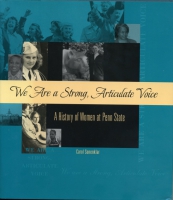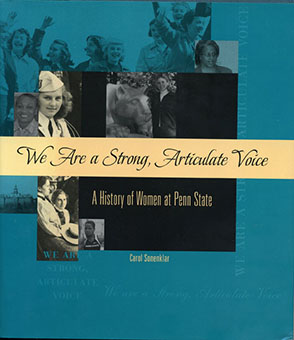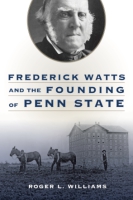We Are a Strong, Articulate Voice
A History of Women at Penn State
Carol Sonenklar
No history of Penn State is complete without the stories of its many achieving women. From Rebecca Ewing, the first female graduate, to early pioneering faculty members like Harriet McElwain and Lucretia Van Tuyl Simmons, to latter-day standouts Pat Farrell, Nina Federoff, Cynthia Baldwin, and Connie Moore, women have been an integral part of Penn State’s tradition of excellence. In We Are a Strong, Articulate Voice, Carol Sonenklar traces the collective path of female students, staff, and faculty at the University.
- Description
- Table of Contents
- Sample Chapters
- Subjects
Women have overcome many obstacles in their march toward equal representation and professional recognition at Penn State. We Are a Strong, Articulate Voice provides a unique look at their struggle, revealing moments that have shaped the history and identity of the University. The clash between female undergrads and the housemothers charged with keeping them out of trouble, the rise of sororities, the invaluable contribution of the Curtiss-Wright Cadets during World War II, firsthand accounts of the infamous 1950s panty raids, the effect of Title IX on women’s athletic programs—events big and small, solemn and silly, are all recorded here.
Sonenklar also examines recent milestones in women’s progress at Penn State, including one of the most important events of the last twenty-five years: the formation in the 1980s of the Strategic Study Group on the Status of Women. She considers the gains made by women faculty, staff, and students in the years since, while looking ahead to the opportunities and challenges of the future. Based on personal interviews and extensive research in the University Archives, We Are a Strong, Articulate Voice combines a lively narrative with dozens of striking photographs, making this book a fitting tribute to women’s progress at Penn State.
Contents
Foreword by Graham B. Spanier
Preface
Acknowledgments
1. Gaining the Privileges of Education
2. Few in Number but Strong in Influence
3. Making Strides
4. Improving the Learning Experience
5. Standing In for the Men
6. The Home Economists
7. Yours for Happy Living
8. A Time of Unrest
9. Feminism and Fair Play
10. Leveling the Field
11. Redefining Roles
12. The Future Is Ours
Afterword by Janis E. Jacobs
Index
Preface
It was a brisk Sunday afternoon in January of 1930. Eighteen-year-old Grace Baer, just finished with her first semester at the Pennsylvania State College, sat in her dorm room with her two roommates. Grace was living on her own for the first time in the freshman dorm McAllister Hall—“Mac Hall” to everyone on campus. Studying in her room on “fourth floor north,” Grace was interrupted by the girl on phone duty. She had a call.
Grace had just come back from spending the Christmas break with her family in Reading. The fourth of six children, Grace was the first in her family to go to college. Graduating in 1929 at the top of her Reading High School class, she was awarded a scholarship from the Women’s College Club of Reading—three hundred dollars a year for each of the first two years of college.
However, by the fall of 1929, Grace could see that even with the scholarship she would still not have enough money to go away to college.
“The stock market had just crashed and everything was in great upheaval. Not that it affected my family much,” she laughs. “We never owned any stock.”
She decided to take some postgraduate classes at her high school, where she met the new principal, John P. Lozo.
“I’ll never forget his name because the man changed my life,” she recalls. “He told me to go to the Pennsylvania State College. He’d taken courses there and said it was a great place and very affordable.”
“All right,” Grace remembers thinking. “I’ll go to Penn State then.”
And she did, arriving in State College in the fall of 1930. At that time there was no tuition per se, but students were responsible for an “incidental fee” of $67.50 in addition to room, board, and books. Grace could not have attended the Pennsylvania State College and lived in Mac Hall without the scholarship from the Women’s College Club.
Although enrolled in the School of Education, Grace Baer had always been a performer, well known around Reading. When she arrived at the College, many students knew of her talents and frequently asked her to perform. She performed solely for female audiences, because women were not permitted to join the Thespian Club. When there was a woman’s role in a play or revue, a man would play it.
Then came that afternoon in January. Grace picked up the phone in the hallway. She was surprised by who it was: Sock Kennedy, director of the Thespians and another individual who would change her life.
“Sock said that he’d heard about a freshman girl from Reading who was singing and dancing for the coeds’ parties,” recalls Grace. “He was over in Schwab auditorium rehearsing for the first revue of the year, and would I come over to Schwab to talk?”
With her pink satin tap shoes tucked under her arm, Grace walked the short distance to Schwab Auditorium and entered one of the side doors. Sock was waiting for her. She looked up at the stage and saw a couple of guys rehearsing a skit. A good-looking fellow onstage caught her eye.
Sock wanted to see how much Grace knew about performing, so they went to one of the practice rooms.
“Sock asked if I could do the time step, which is a hoofer’s basic dance step,” she says. “Of course I could. Any experienced hoofer could do a time step.” She put on her tap shoes and demonstrated.
“Sock got so excited he jumped up and down and practically fell on me,” Grace recounts. “We’ve got to dance together!” Sock exclaimed. Five days later they performed in the revue.
The rest is history. Grace broke new ground for girls in the previously all-male Thespian Club at Penn State and, not incidentally, went on to marry Ken Holderman, the good-looking fellow who was rehearsing on stage that first Sunday.
By the time Grace broadened women’s opportunities in the performing arts at the College, women were making inroads in all aspects of University life. The women you will meet in the following pages represent all those aspects of change. On every front of college life—academic, administrative, social, and athletic—women slowly but persistently made their presence known. In some cases that meant joining the men (as with the Thespians); in other cases, it meant creating an organization just for women. Some struggles were obvious, as in the attempts to get more housing for women on campus. Other struggles were not so overt but were more difficult to overcome: the fight to enroll in the all-male classes, the fight to be taken seriously in the intellectual arena and in the student publications. Women had to prove over and over again that they were up to the task—whatever the task might be.
We will also look at the many “hidden” women who had serious impacts on the lives of other women at Penn State. Wives and daughters of faculty and administrators rewrote their roles in university life, influencing all aspects of “town and gown.” By establishing off-campus clubs and organizations, these women not only helped the community at large but eased the isolation of many students and faculty who missed their homes and families.
This book will also examine the historical context within which women existed at the University and in the small town of State College. As the twentieth century progressed, coeds became less segregated and more a part of the overall student body. But, as important as this progress is, we must recognize that not all Penn State history is the history of men. Men and women made Penn State what it is today, a place where enrollment—and virtually everything else— is equal for men and women.
But when young Grace Baer made her entrance into the Thespians, she didn’t view it as a triumph or a victory. No one excluded women out of hostility or contempt, she points out. “That’s just the way things were.” What changed to prompt that Sunday afternoon phone call?
Grace tilts her head and gazes off into the distance.
“Well, I think it was just about time it happened.”
We couldn’t agree more.
Also of Interest
Mailing List
Subscribe to our mailing list and be notified about new titles, journals and catalogs.






